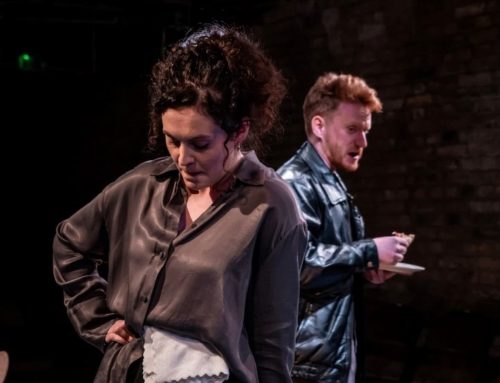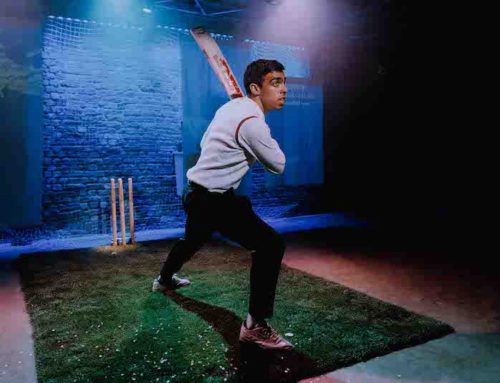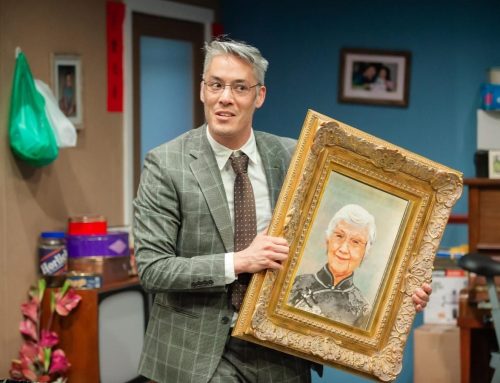Writer Josh Azouz’s work Once Upon a Time in Nazi Occupied Tunisia, which had a well-received run at the Almeida Theatre back in 2021, explores personal stories within the broader context of war and occupation. His latest work Gigi and Dar, in development since 2016, covers similar territory. Show promotion suggests “Beckett meets Mean Girls” which sounds awful but neatly sums up the piece’s juxtaposition of absurdist tragedy and, initially at least, gleeful comedy. Anticipate a dash of lurking Pinteresque menace thrown in for good measure.
A twangy guitar version of Gershwin’s Summertime, And The Livin’ Is Easy opens Gigi and Dar, one supposes it is meant ironically. It is certainly a hot and dusty day at roadblock 432, somewhere close to the frontline of an unnamed and seemingly longstanding military conflict. But things are not that easy. The main problem early 20s women soldiers Dar (a fabulously engaging Lola Shalam) and Gigi (Tanvi Virmani) face is unutterable boredom. After 724 days of “no action but sun and dust” they have six days of service left and just cannot wait to get out.
The mismatched but caring duo pass the time with truth-or-dare and mulling over their futures: posh-girl Gigi wants to write horoscopes and wise-cracking Dar imagines designing dresses. Their dreams are of death, a gap year “mashed up on shrooms”, and group sex with boyband One Direction (“I’m beautiful and you’ve got a hole” Dar says by way of assurance that Harry Styles will play along). Dar’s key concerns are access to Nutella, rolling up sleeping bags correctly, and wondering about her boyfriend’s fidelity. In a piece of terrible foreshadowing Dar promises by way of retribution for possible adultery that, “I’ll castrate the guy and shoot the girl”.
Gigi has concerns too, chief amongst which (we learn very early on) is keeping from Dar the news that she is the one who has shagged Dar’s boyfriend. This could be two teen girls lipping up and shooting the breeze at a retail park in Essex, except they have loaded machine guns slung over their shoulders, an endless brutalising war to contend with, and a border checkpoint to guard.
In a Pinteresque nod, one of many, strangers intrude in the form of pregnant, dress-shop owner mum Zoz (a haunting turn by Chipo Chung) and her car-loving teenage son Sim (Roman Asde on great form). They need to pass the checkpoint to get a sickly mum to a hospital. Things initially go smoothly. Gigi and Sim chat about James Bond and cars, and exchange emails. But then a penny drops in Dar’s mind about just who has been shagging whom. The two civilians become easy targets for Dar’s visceral anger. What follows is a dark, despairing demonstration of the law of unintended consequences.
Azouz initially set Gigi and Dar in the context of Israel and Palestine. Consciously removing the current political context from the piece allows wider issues to air free of contamination. Specifically, how is it that run-of-the-mill people can bury their humanity and become brutalised thugs when circumstances allow. All the same, it is hard not to view the piece without reflecting on current events in Gaza. The writer plays with time throughout the piece. Days become months, something which suggests this conflict is decades old in the making and has decades yet to run.
While Azouz is scrupulously even-handed to his characters, and all the characters here suffer in some way, some suffer more than others. Late on in the most affecting moment of the play Chung’s Zoz sings a bewitchingly beautiful lament to lost children. It is a lament to lost innocence too, and to the challenge young and old alike face when placed in almost impossible situations.
Azouz’s characters break the fourth wall throughout, confiding secrets to the audience to which other characters are not privy. It is a neat way of making us complicit in evolving events. The extent to which bystanders become implicit in the crimes they observe from afar is, perhaps, another of the writer’s themes.
The eminent actor-director Kathryn Hunter milks the comedy for maximum effect in the very funny first half, aided by finely tuned comic performances from Shalam and Virmani. The piece’s initial zip spirals to a slower, more meditative and more painful second half. A dream-like, poetic sequence late on offers hope that life can eventually spring from the blood and the dry desert sand.
Writer: Josh Azouz
Director: Kathryn Hunter
More Recent Reviews
Milked. White Bear Theatre.
Written in 2013 and first seen a decade ago in a production at the Soho Theatre, Simon Longman’s slice [...]
Fresh Mountain Air. Drayton Arms Theatre.
Lana Del Rey’s ode to female unity and resilience, God Bless America And All the Beautiful Women In It, [...]
Rodney Black: Who Cares? It’s Working. Lion and Unicorn Theatre.
Rodney Black is a tacky small-time comedian with a venal manager and a taste for nasty misogynism. “I’m a [...]






